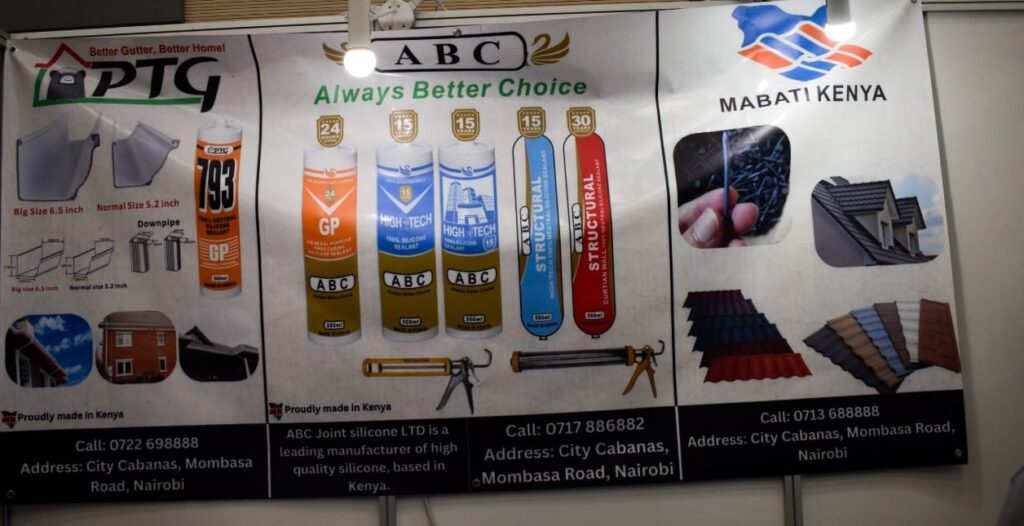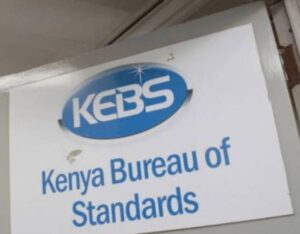Akash Patel, Sales GM at ABC Joint Silicone Ltd talks to JEDCA Media during the 8th Kenya International Industrial Expo 2025. Photo | Caleb Korir/JEDCA Media.
Manufacturing is one of the key sectors that has the potential to propel Kenya’s economy to new heights. However, the sector has long struggled with challenges such as poor policy reforms and a punitive tax regime.
Currently, manufacturing contributes only 7.6 percent to the country’s Gross Domestic Product (GDP), yet research shows that a one percent increase in the sector can create up to 200,000 jobs.
At the heart of this transformation is Akash Patel, the Sales General Manager at ABC Joint Silicone Ltd, a company that manufactures silicone products at City Cabanas in Nairobi.
Despite the sluggish growth of the manufacturing sector, Patel remains optimistic that it holds the key to Kenya’s economic future.
ABC Joint Silicone manufactures a range of silicone materials used for sealing, repairs, and rain gutters, and also sells iron sheets.
“Silicone is a day-to-day item. It’s used in construction, renovation even if your window has a problem you use silicon to repair. It’s a continuous business because you cannot see silicon run out of market. There is so much opportunity and growth in this business and our vision is not just only Kenya but to expand to the entire East Africa,” Patel says.
“We have already started selling in Rwanda and Tanzania. The next target is Uganda,” he adds.
For manufacturers, Patel notes that selling directly to consumers is not advisable, as retail buyers often purchase in small quantities, denying the company economies of scale.
“Most of our business is through hardware shops where our distributors sell our goods and sell to retailers or other wholesalers. Those are the people who would use our products maybe in affordable housing indirectly. Our business is mostly B2B because as manufacturers we need to move volumes. It’s more sensible for us to move volumes than to sell one piece. It doesn’t make sense to our factory,” he explains.
Tax Regime
Patel says there are notable tax advantages for local manufacturers compared to importers of finished goods. The company pays VAT, corporate tax, and import duties on raw materials.

“The good thing with importing raw materials instead of finished goods, the advantage we have in the local market is that when we manufacture, the duties and taxes are low compared to those people importing finished goods because the taxes on finished goods are higher. We enjoy the benefits,” he says.
ALSO READ: Why Crypto May Redefine How We Pay and Move Money in Kenya
Despite the tax incentives, Patel urges the government to do more to protect local manufacturers from foreign companies exporting to Kenya, arguing that local firms play a crucial role in job creation.
Currently, ABC Joint Silicone Ltd employs 50 people, even though it has been in operation for less than a year.
However, the company faces stiff competition and licensing hurdles. Patel says importers enjoy economies of scale, allowing them to sell at lower prices and undercut local manufacturers’ profits. He adds that acquiring the necessary licences and certifications to start manufacturing in Kenya remains a tedious process.
“The challenge is very big competition from importers because what happens with importers, when something is being manufactured in China, they enjoy economies of scale and with economies of scale, importing is cheaper compared to manufacturing within Kenya,” Patel points out.
Still, he sees opportunity in local production and welcomes competition, believing it encourages quality and innovation.
Building Brand Awareness
To reach a wider market, Patel says ABC has adopted a mix of marketing strategies, including digital campaigns, community outreach, and charity initiativesall of which have boosted brand awareness and growth.
“We have a digital team and we offer free merchandise to our distributors to promote our products to small retailers and finally to consumers. We also do charity events where we help needy people as well as having a marketing team on ground. Exhibitions have also worked so well for us,” Patel told JEDCA Media during the 8th Kenya International Industrial Expo 2025.
Advice to Other Entrepreneurs
Patel encourages aspiring entrepreneurs, especially the youth, to take risks and venture into business, saying Kenya has vast untapped potential.
READ: Wowzi: How Friends Built A Company That Connect Creators With Brands
“Do not shy away from getting into business. Once you take a risk our country has so much potential, it’s a developing country and you will get a good opportunity to do business. Maybe in the first two or three years you might not recover your money but at some point you will break even and later you will enjoy the profit,” he says.
“Young entrepreneurs should enter the market. We should encourage our Gen Zs to be more of entrepreneurs rather than importers. What happens when we import is a deficit in the balance of trade and it affects our economy. It’s better to manufacture locally and import the raw materials,” he concludes.




